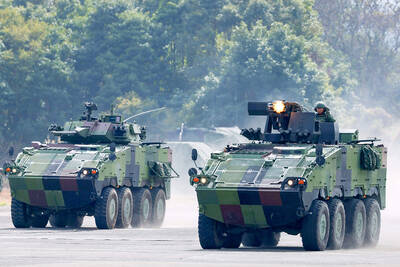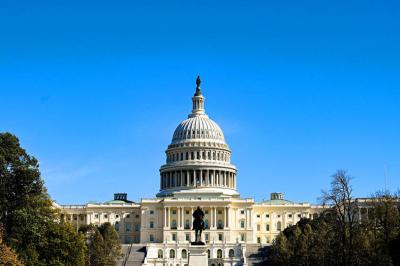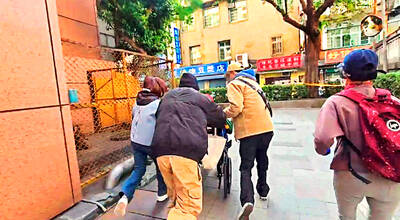Former president Lee Teng-hui (李登輝) had information he wanted to share with a visiting former US official earlier last week, but he did not feel comfortable doing so in the presence of Taiwanese government officials, the Taipei Times has learned.
Lee on Monday met with Richard Armitage, the deputy secretary of state during former US president George W. Bush’s first term in office, during the latter’s visit to Taiwan.
Prior to the meeting, Lee allegedly said that as some Ministry of Foreign Affairs officials would be present during their meeting, he would pass on a message to Armitage in the form of a letter. He allegedly said he could not trust some of the ministry officials and that his discussion would center on general topics like Japan.
As the body responsible for relations with current and retired officials from other countries, it is customary for the ministry to accompany delegations and provide transportation, as well as make arrangements for meetings with Taiwanese officials.
Armitage, who has retained some influence in Washington despite his retirement from government service, was heading a delegation of academics from the Project 2049 Institute, a US-based think tank.
A source close to the former US State Department official who accompanied him on his visit confirmed to the Taipei Times on Wednesday that Lee had given him a letter. The source, who was privy to the contents of the letter — which consisted of a few pages — said it touched on the former president’s apprehensions about the future of Taiwan and the direction of cross-strait talks under the Chinese Nationalist Party (KMT) administration.
In one section of his missive, Lee, who was expelled from the KMT in 2001 for his pro-independence views, reportedly says that if President Ma Ying-jeou (馬英九) were re-elected next year, the future of Taiwan as an independent country would be very much in doubt.
Armitage left Taiwan on Wednesday while the rest of his delegation remained in Taiwan for further meetings.

Taiwan must first strengthen its own national defense to deter a potential invasion by China as cross-strait tensions continue to rise, multiple European lawmakers said on Friday. In a media interview in Taipei marking the conclusion of an eight-member European parliamentary delegation’s six-day visit to Taiwan, the lawmakers urged Taipei to remain vigilant and increase defense spending. “All those who claim they want to protect you actually want to conquer you,” Ukrainian lawmaker Serhii Soboliev said when asked what lessons Taiwan could draw from Russia’s invasion of Ukraine. Soboliev described the Kremlin as a “new fascist Nazi regime” that justified

The US House of Representatives yesterday passed the PROTECT Taiwan Act, which stipulates that Washington would exclude China from participating in major global financial organizations if its actions directly threaten Taiwan’s security. The bill, proposed by Republican US Representative Frank Lucas, passed with 395 votes in favor and two against. It stipulates that if China’s actions pose any threat to Taiwan’s security, economic or social systems, the US would, “to the maximum extent practicable,” exclude China from international financial institutions, including the G20, the Bank for International Settlements and the Financial Stability Board. The bill makes it clear that China

‘T-DOME’: IBCS would increase Taiwan’s defense capabilities, enabling air defense units to use data from any sensor system and cut reaction time, a defense official said A defense official yesterday said that a purported new arms sale the US is assembling for Taiwan likely includes Integrated Battle Command Systems (IBCS). The anonymous official’s comments came hours after the Financial Times (FT) reported that Washington is preparing a US$20 billion arms sale encompassing “Patriot missiles and other weapons,” citing eight sources. The Taiwanese official said the IBCS is an advanced command and control system that would play a key role in President William Lai’s (賴清德) flagship defense program, the “T-Dome,” an integrated air defense network to counter ballistic missiles and other threats. The IBCS would increase Taiwan’s

NOMINAL NEWLYWEDS: A man’s family and his wife — his long-term caregiver — are engaged in a legal dogfight over the propriety and validity of the recent union A centenarian’s marriage to his caregiver unbeknownst to his children has prompted legal action, as the caregiver accuses the man’s children of violating her personal liberty and damaging her reputation, while the children have sought a legal option to have the marriage annulled. According to sources, the 102-year-old man surnamed Wang (王) lives in Taipei’s Zhongshan District (中山) and previously worked as a land registration agent. Wang reportedly owns multiple properties and parcels of land worth several hundred million New Taiwan dollars and has ten children. His caregiver, a 69-year-old surnamed Lai (賴), has been caring for him since about 1999,